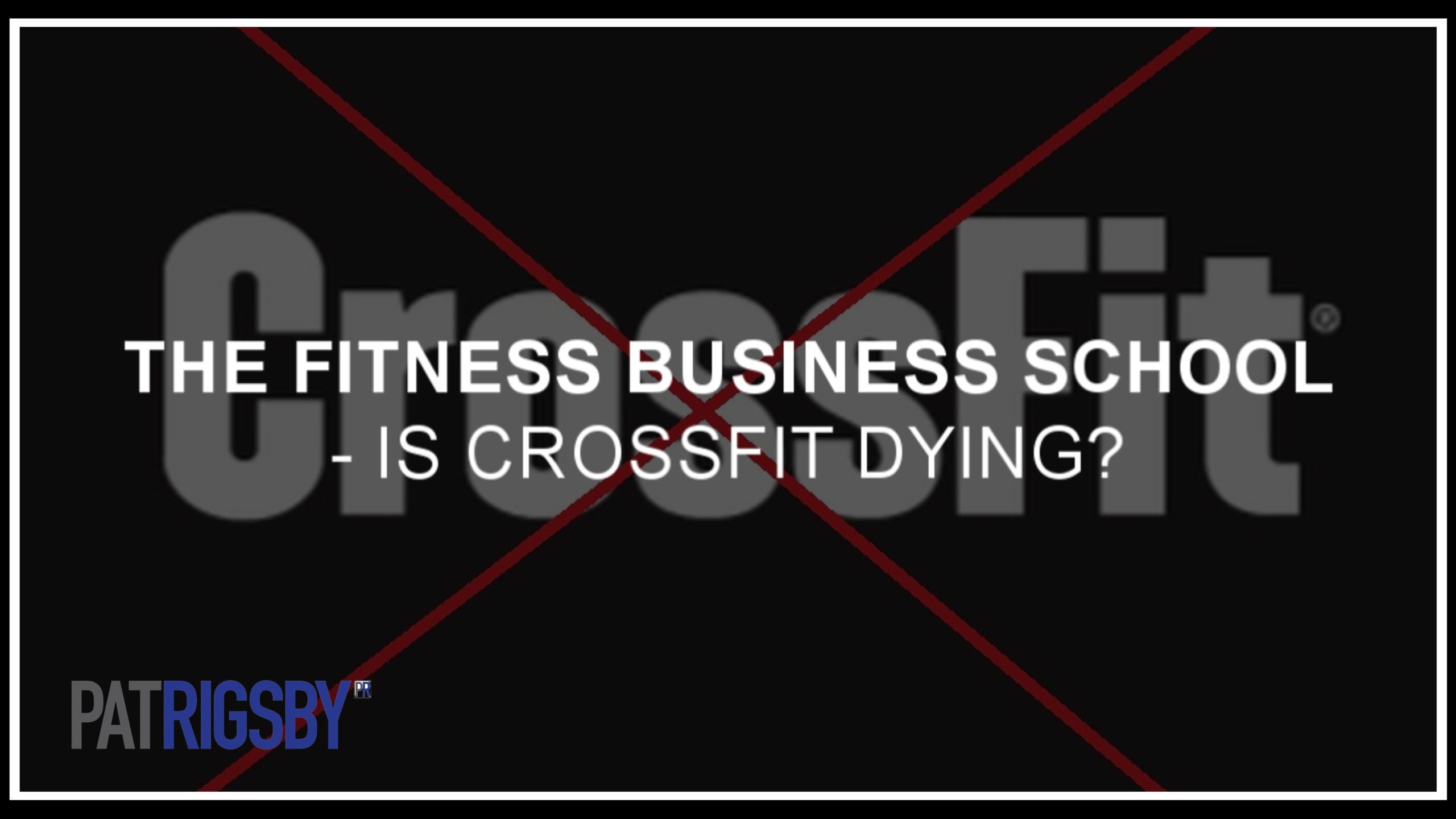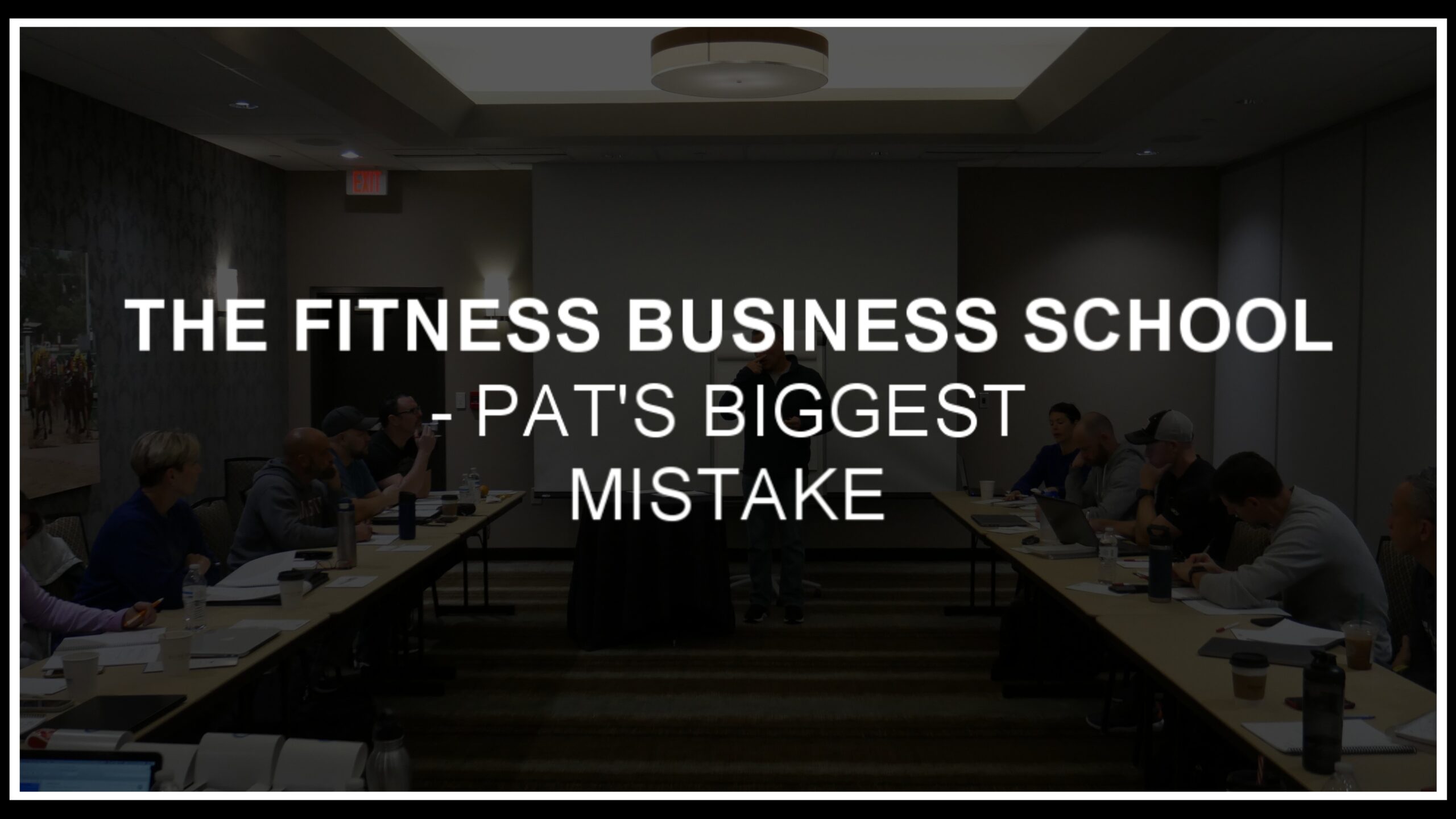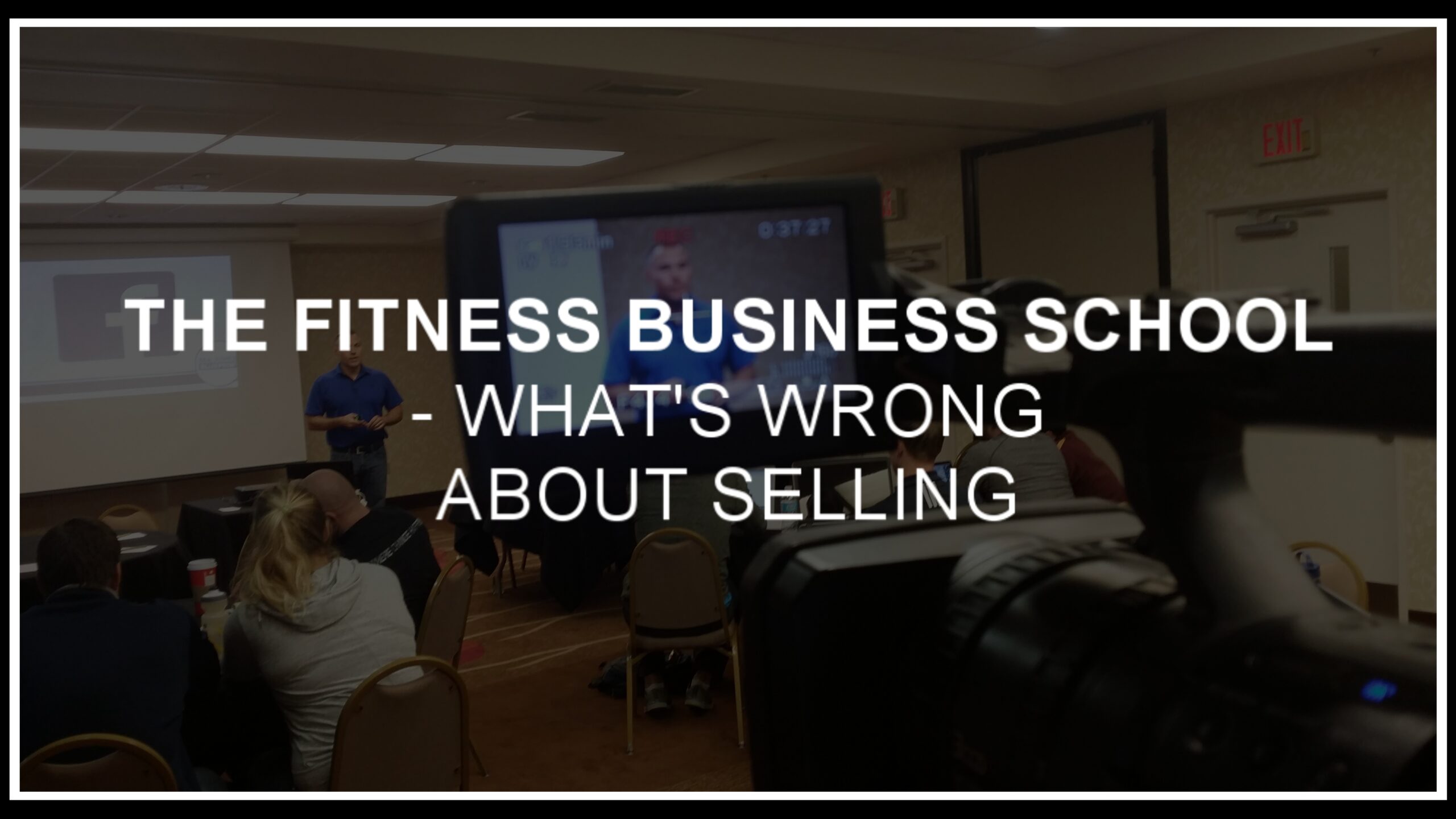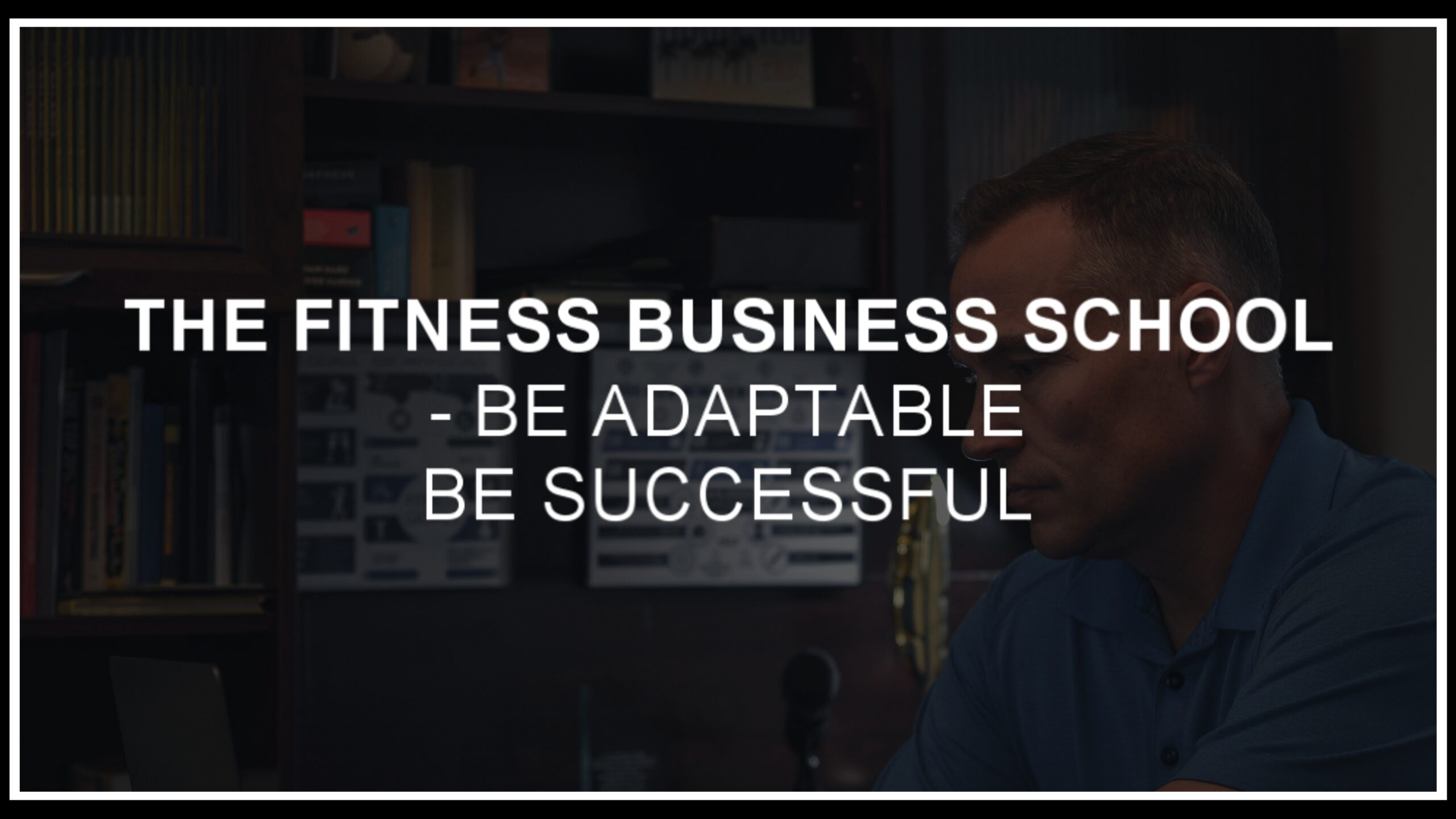Show Notes
- Pat’s talking CrossFit
- CF’s CEO is under fire for some tone deaf comments
- Are they dead?
- CrossFit’s demise may be eased by their business model
- CF is polarizing, but has done many good things for fitness community
- Reminder on what it takes to be a leader
P.S. – 6-Weeks of Coaching…Free.
Get a surge of new clients and revenue over the next 6 Weeks with ZERO FEE and no obligation to continue?
If you’re a current business owner who wants to add 50K or more in annual revenue over the next 12 month, you can Test Drive our coaching program for 6 Weeks with no fee or even an obligation to continue as a way to demonstrate how we can help you grow your business.
No strings attached. No obligation. You get our best coaching & tools…and hopefully, you’ll love it enough that you want to keep working together.
Would you be interested in discussing?
If so, email me here with ‘interested’ in subject line and we’ll set up a chat.
Your Content Goes Here
Full Transcript
Hey, Pat Rigsby here. And in this episode, I want to talk with you about CrossFit and whether or not this is the fatal blow to the CrossFit brand. So, you know, I’ve got a variety of things to share on this. Some thoughts, some some historical references, and really maybe just an opinion on where things are headed as it relates to CrossFit it’s competitors, it’s box owners and so much more. So let’s get into it.
Welcome to the fitness business school with Pat Rigsby, the podcast for fitness entrepreneurs who want to make more income, have greater impact, and enjoy more freedom in their ideal business. If you’d like an accelerated route to these goals, email me at [email protected] and put BGA in the subject line and I’ll get you all the details about our business growth accelerator program.
All right, let’s talk about CrossFit. Honestly, this may be the first time that I’ve ever even mentioned CrossFit on a podcast. Certainly not a topic I spent a lot of time on in email or anything like that, but it’s you know, it’s definitely a brand that I’ve paid a lot of attention to over the past 15 or so years. And you know, I’m assuming you probably know at this point that the CrossFit founder, CEO you know, made some remarks and later a post on Twitter that at best could be considered pretty insensitive and very tone deaf. And, you know, the fallout was swift, Reebok who they were in negotiations with to renew their partnership contract with said they were going to cease on negotiations. Some of their top CrossFit games athletes have already you know, acknowledged that they’re no longer going to be part of the brand. Some of the more prominent affiliates left and, you know, there’s been a pretty significant exodus of affiliates so far in just a matter of days nil at least, you know, well, I’m recording this podcast. It’s just been a handful of days and you know, it is a question that I’ve received a few times already. Hey, is the CrossFit brand dead? So let’s, let’s kind of dig into this.
First of all, I would tell you that you know, CrossFit was already trending downward is a brand. I mean, their CrossFit games registrations just over the last couple years had been cut almost in half. They had had, I believe in 2000, over 400,000 participants. And then in the 2020 the registration for this you know, less than half of that, or about half that number had enrolled to to be part of this there, you know, there’s certainly been a downturn in the number of box owners, the number of new box owners. And, you know, I don’t necessarily know that is something that, that just wouldn’t happen to most brands on their own. I mean, if you think about the fact that CrossFit has been around, you know, I, I guess for roughly 20 years and has become relatively prominent over the past 15, you know, how many brands do you know in, you know, like the restaurant industry that we’re the, you know, at the top of the pyramid 20 years ago, that are still at the top of the pyramid, you know, trends kind of come and go things change. I know when I first started paying attention to the fitness industry first got involved in strength training Nautilus was a big, big name. And, you know, there were clubs that were based entirely around Nautilus machines. And in fact you know, the way that somebody might go into a restaurant and just say, Hey, I want to cope knowing that, you know, I mean, they’re asking for the brand name instead of just a general type of beverage you know, people would refer to health clubs as novelists clubs for, for quite a while.
And you know, that that trend disappeared the heavy, a reliance on select derived equipment. You know, that kind of took a hit for quite a while. Things like Zumba have had their kind of peak. And so I think it would be reasonable to expect that CrossFit would probably follow a similar path now because of the strong allegiance to the brand from so many affiliates. And so many of their clients probably have you know, has enjoyed a, a longer shelf life than most businesses, but, you know, most brands don’t go on forever, especially without some sort of evolution. And, you know, one thing that just from an observational standpoint, it seems like the founder and CEO you know, is, is a guy who probably thinks he’s usually right on most everything. And isn’t really interested in evolving and changing his perspective or opinion.
And, you know, I, I think that can be dangerous as an entrepreneur, but, you know, is CrossFit dead? You know, I don’t think it’s dead at the moment, but I think that was the, you know, the, the fatal blow that will ultimately lead to its demise because, you know, a lot of people who are involved with CrossFit or renew their affiliation, do it largely because they know that having CrossFit attached to their brand name drives them a lot of traffic. It’s a really significant source of leads for so many businesses, because, you know, that’s just a word that is very regularly searched for. It is a, you know, a brand that is recognized as a specific style of training, even if it’s not you know, a style of training that’s exclusive to that brand. It’s just something that, you know, somebody, if they’re going to search, they may search for that. And so a local business having that name attached could continually see a number of prospects and number of clients come in that would be in value a, you know, being a value to that business that would often far exceed the affiliation fee. But you know, now I don’t necessarily know that that brand recognition or that tie to that brand is going to have nearly the value. So it doesn’t make fiscal sense, let alone you know, people whose values no longer align with the brand or the founder you know, it doesn’t make business sense at all to be involved with the brand, if it may be an anchor instead of something that boosts the business.
Now, you know, I think also, you know, clearly there were a number of things that ease the demise of this CrossFit. You know, it wasn’t a franchise, or isn’t a franchise, it’s a license that has a very short term agreement to be able to use that brand and be an affiliate for a very nominal fee in you know, in the whole franchising licensing world, a nominal fee. And so there’s no real reason somebody can’t break their relationship with CrossFit pretty quickly, as opposed to, you know, if they’ve signed a 10 year franchise agreement with some of these other brands, it may be a much more challenging thing to unwind. So, you know, if people want to leave, they’ll have the ability to leave, they’ll have the ability to rebrand. And, you know, though those businesses you know, CrossFit has, I believe the last that I checked had about 15,000 affiliates worldwide, about 6,000 in the United States. And, you know, there weren’t restrictions on the proximity they could be in, you know, in like within one another, there weren’t guidelines or a lot of advice on how to market. So the, the businesses themselves that were run by successful business owners, people that you know, do a good job, provide a good service. They’re gonna probably continue to succeed quite well. It, you know, without the CrossFit brand, they understand the fundamentals of business they’re providing you know, a, a strong community there you know, providing an approach to fitness that is attractive to the clients that they’re bringing in. So they’re going to be fine. And the businesses that were kind of propped up and just kind of riding that CrossFit name, they’re probably going to struggle are probably going to even even need to close maybe a little bit sooner than they would have earlier. But, you know, I think we’re seeing that in the industry as a whole, the, the businesses that were on what I would call life support the, the whole pandemic and in the shutdown is probably accelerating the, the ultimate closure of a lot of those businesses anyway. And I think this sort of shift for CrossFit may accelerate the, the closure or the demise of the businesses that weren’t really equipped to be sound successful businesses, but let’s face it.
You know, I know a lot of people in our industry are very polarized by CrossFit, which you know, I think that’s that that’s in many ways what the founder and CEO has wanted, because he’s just a pretty polarizing guy. And ultimately that may, may be the final death blow there is by being so polarizing. But, but, you know, I think it would be unwise for us not to acknowledge the fact that CrossFit helped accelerate the acceptance of a more functional training approach. People being willing to get out of big box health clubs, or high end real real estate, and being willing to go train in a warehouse or using barbells and kettlebells and, you know, training in a different way, regardless of, you know, whether or not the, you know, the, the questions about the safety of CrossFit training or their qualification, their coaches come up. I mean, if you’ve ever spent time in big box health clubs or anything like that, there are plenty of trainers. So I don’t necessarily know that I would consider qualified or you know, at the standard that so many of us would like the people in the industry to be. So I don’t know that that was exclusive to CrossFit, but it certainly you know, was something that I’d hear a lot of trainers talk about, but CrossFit helped bring group training to the forefront maybe a little bit faster than it would have otherwise CrossFit certainly heightened the awareness of both functional training and the role that group training and community plays in you know, in somebody’s potentially successful fitness journey.
So, you know, I think there’s been plenty of good to learn from, from what CrossFit’s done and plenty of opportunity for the you know, the, the stronger affiliates to continue on and be a viable player in the market. So if you heard this news back CrossFit, and just assume that, Hey, all those gyms are gonna close and that’s going to be a bunch of people that maybe I can get into my business. You know, I don’t really think that’s how it’s going to work, but I do think that, you know, the, this is going to accelerate the downward slide. I would assume that things like the CrossFit games may, may very well kinda in under their current format and maybe come back is a, a different sort of competition under a different brand name. And this is just speculation. This is just my opinion, but wouldn’t be surprising to see them come back as an invitation with different sponsors. It wouldn’t be surprising to see you know, more and more businesses non-renew even the people who haven’t come out publicly as of yet, because the benefit of being an affiliate just isn’t going to be nearly as powerful or strong as it might’ve been previously.
So just some thoughts on where this where this is headed. And, you know, it’s probably a reminder to, to all of us that when you’re in a leadership position the way that you carry yourself, the way that you present yourself you know, it, it matters, it matters what your putting out to the public and what you’re sharing with people. And, you know, you have to be willing ride the consequences of those things. And, and perhaps that’s you know, and perhaps that’s okay for them, but, but I think that it is, it, it is really important to understand that if you’re going to be in this position, whatever you’re doing on social media, whatever you’re doing publicly you know, as a business owner, it’s under the microscope and, you know, so, so my suggestion is to think about how you want the world to see you and whatever the consequences are for, for your business and your livelihood. You know, they’re, they’re, they’re all gonna be tied together. We don’t get to separate, personal and professional as far as how the world sees us. And this was just a really powerful reminder of that. So, well, just some thoughts on CrossFit kind of random, I think, as I went through that, but thought it was worth sharing. So I’ll be back with maybe a more traditional episode soon. See ya.
Thanks for listening. I’m giving away a bundle of my bestselling books, the ideal business formula, the fitness entrepreneur handbook in the path. All you have to do is go to patrigsby.com/podgift to get it. Also, make sure to subscribe to The Fitness Business School with Pat Rigsby so you don’t miss an episode and you get yourself on the fast track to creating your ideal business.










